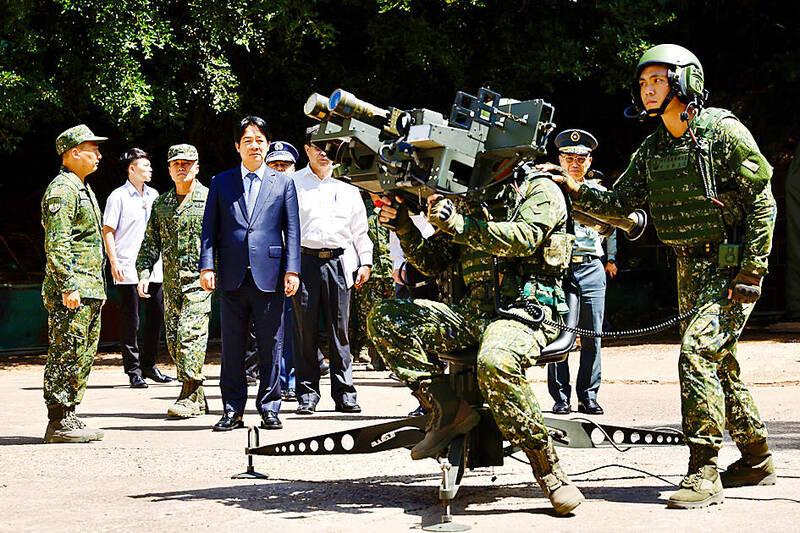The US “strongly encourages and applauds” the efforts made by President William Lai’s (賴清德) administration to bolster Taiwan’s self-defense through reforms and investments, said Ingrid Larson, managing director of the American Institute in Taiwan’s (AIT) Washington Office.
Larson made the remarks on Monday when introducing Vice Minister of National Defense Hsu Yen-pu (徐衍璞) as the keynote speaker at this year’s US-Taiwan Defense Industry Conference in Philadelphia.
In her speech, Larson said that throughout the past year, Beijing has continued to employ a whole-of-government approach using a range of diplomatic, informational, military, financial, intelligence, law enforcement and economic measures to pressure and coerce Taiwan.

Photo: Ritchie B. Tongo, EPA-EFE
One example she raised is how the Scottish city of Edinburgh ended plans for a sister city relationship with Kaohsiung due to Chinese pressure.
“Such actions are not conducive to promoting people-to-people ties, or the peaceful resolution of cross-strait differences,” she added.
The US “strongly encourages and applauds the Lai administration’s early efforts to continue to bolster Taiwan’s self-defense through reforms and resource investments,” such as the proposal to increase Taiwan’s defense budget for next year by nearly 6 percent to about US$20 billion, she said.
The US also welcomes Minister of National Defense Wellington Koo’s (顧立雄) support for significant defense reforms, including the establishment of a new entity within the defense ministry modeled after the US’ Defense Innovation Unit, she said.
On the topic of the Lai administration’s Whole-of-Society Defense Resilience Committee — which brings together government officials, representatives from the private sector and civil society groups to promote society-wide involvement in national defense — Larson said: “We support his approach.”
While the US remains committed to enabling Taiwan to maintain sufficient self-defense capability, she said that maintaining peace and stability goes beyond conventional defense, and should also include the enhancement of Taiwan’s whole-of-society resilience to ensure it is resilient, secure and interconnected within the global community and the global economy.
“This means strengthening the US-Taiwan unofficial relationship, raising global awareness of the importance of peace and stability in the Taiwan Strait, expanding Taiwan’s international space and bolstering Taiwan’s economic diplomacy,” she added.
A major focus of the US government has been to bolster Taiwan’s whole-of-society resilience, an effort that spans critical infrastructure protection, humanitarian assistance and disaster relief capabilities, cyberdefense, food security, economic interdependence, energy resilience and financial connectivity, she said.
Deepening ties with the private sector can also help maintain peace and stability in the Taiwan Strait, she added.
Speaking to US business representatives, she said: “When US businesses like you pursue opportunities with Taiwan, you are helping to realize a Taiwan that is more integrated and not isolated, more resilient and less vulnerable to coercion.”
The US’ commercial interest is to deepen economic ties with Taiwan — its eighth-largest trade partner, she added.
With initiatives such as the CHIPS and Science Act, the US welcomes cutting-edge semiconductor manufacturers from Taiwan to come to the US and build chip ecosystems, she said.
US President Joe Biden’s administration is working with the US Congress to reduce the tax burden on US firms in Taiwan and Taiwanese companies in the US, she added.

The CIA has a message for Chinese government officials worried about their place in Chinese President Xi Jinping’s (習近平) government: Come work with us. The agency released two Mandarin-language videos on social media on Thursday inviting disgruntled officials to contact the CIA. The recruitment videos posted on YouTube and X racked up more than 5 million views combined in their first day. The outreach comes as CIA Director John Ratcliffe has vowed to boost the agency’s use of intelligence from human sources and its focus on China, which has recently targeted US officials with its own espionage operations. The videos are “aimed at

STEADFAST FRIEND: The bills encourage increased Taiwan-US engagement and address China’s distortion of UN Resolution 2758 to isolate Taiwan internationally The Presidential Office yesterday thanked the US House of Representatives for unanimously passing two Taiwan-related bills highlighting its solid support for Taiwan’s democracy and global participation, and for deepening bilateral relations. One of the bills, the Taiwan Assurance Implementation Act, requires the US Department of State to periodically review its guidelines for engagement with Taiwan, and report to the US Congress on the guidelines and plans to lift self-imposed limitations on US-Taiwan engagement. The other bill is the Taiwan International Solidarity Act, which clarifies that UN Resolution 2758 does not address the issue of the representation of Taiwan or its people in

US Indo-Pacific Commander Admiral Samuel Paparo on Friday expressed concern over the rate at which China is diversifying its military exercises, the Financial Times (FT) reported on Saturday. “The rates of change on the depth and breadth of their exercises is the one non-linear effect that I’ve seen in the last year that wakes me up at night or keeps me up at night,” Paparo was quoted by FT as saying while attending the annual Sedona Forum at the McCain Institute in Arizona. Paparo also expressed concern over the speed with which China was expanding its military. While the US

SHIFT: Taiwan’s better-than-expected first-quarter GDP and signs of weakness in the US have driven global capital back to emerging markets, the central bank head said The central bank yesterday blamed market speculation for the steep rise in the local currency, and urged exporters and financial institutions to stay calm and stop panic sell-offs to avoid hurting their own profitability. The nation’s top monetary policymaker said that it would step in, if necessary, to maintain order and stability in the foreign exchange market. The remarks came as the NT dollar yesterday closed up NT$0.919 to NT$30.145 against the US dollar in Taipei trading, after rising as high as NT$29.59 in intraday trading. The local currency has surged 5.85 percent against the greenback over the past two sessions, central